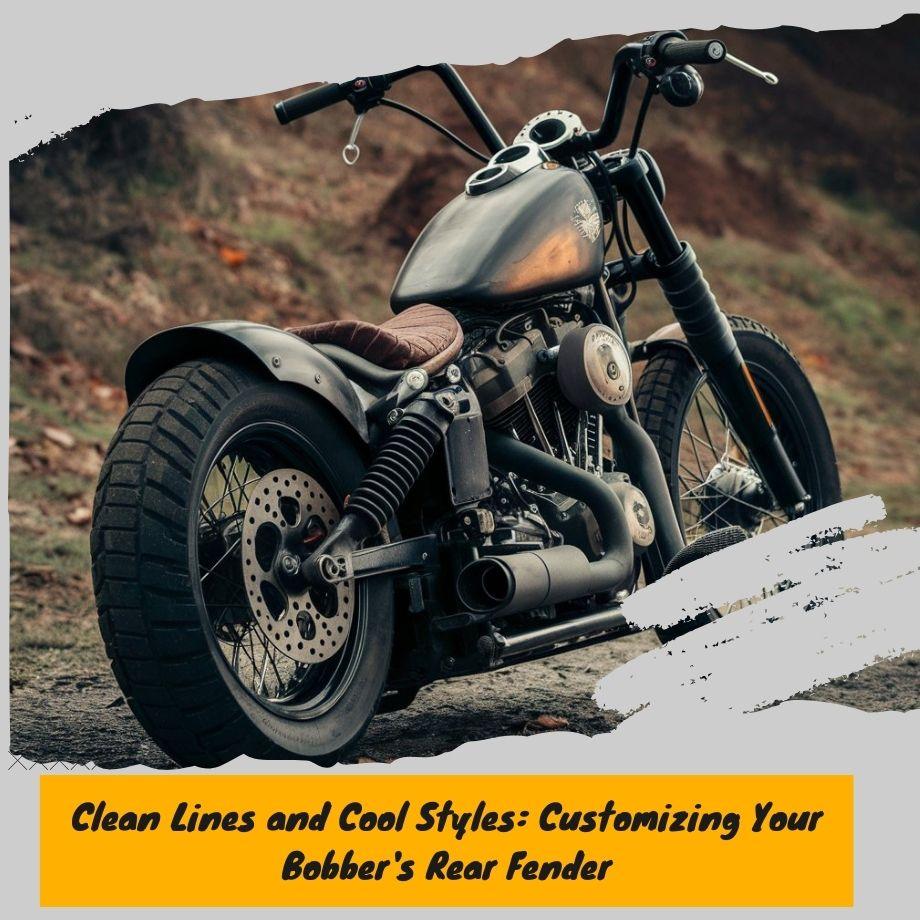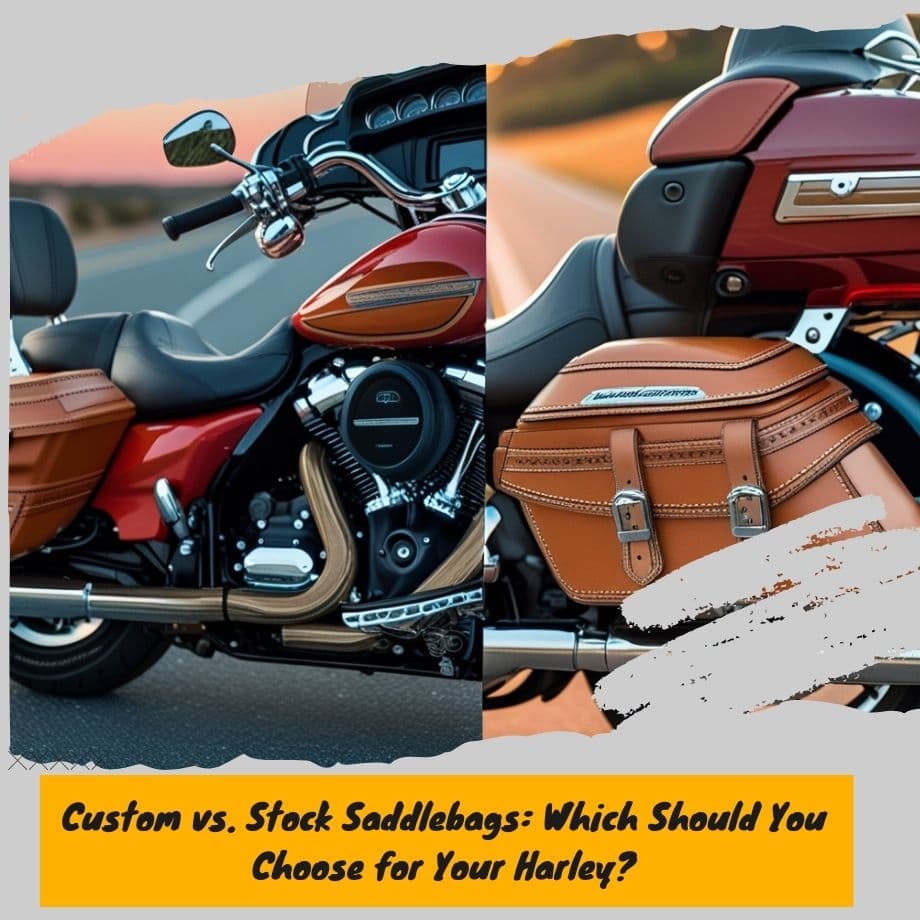Dressing Up Your Ride: Creative Bobber Rear Fender Ideas for Your Harley

What is a Bobber Rear Fender?
A bobber rear fender, also known as a bobber mudguard or bobber back fender, is an essential component of the iconic bobber motorcycle style.
Bobbers are custom-built motorcycles that originated in the 1940s and 1950s, characterized by their stripped-down and minimalist appearance.
The rear fender on a bobber motorcycle serves a functional purpose, protecting the rider and the motorcycle's components from road debris, water, and mud kicked up by the rear wheel.
However, in the bobber style, the rear fender is often shortened or "bobbed," giving the motorcycle a distinct, streamlined look that epitomizes the bobber aesthetic.
The bobber rear fender's significance extends beyond its practical use. It is a visual representation of the rebellious spirit and individualism that define the bobber culture.
By removing unnecessary parts and trimming down the fender, bobber enthusiasts create a unique, bare-bones motorcycle that reflects their desire for simplicity and freedom on the road.
For more detailed information on custom rear fenders, check out motorcycle rear fender guide.
The Evolution of Bobber Rear Fenders
Bobber motorcycles have a rich history deeply rooted in the early days of American motorcycle culture.
The rear fender, often referred to as the "bobber rear fender" or "bobber mudguard," has played a significant role in shaping the iconic bobber style.
In the 1930s and 1940s, young riders sought to strip down their motorcycles, removing unnecessary parts to reduce weight and increase performance.
This practice, known as "bobbing," gave rise to the bobber style. One of the first components to be removed was the rear fender(Remove a Harley Rear Fender), as it was seen as unnecessary weight and a hindrance to the bike's agility.
Early bobbers were essentially stripped-down motorcycles with minimal fenders, if any at all.
Riders embraced the raw, minimalist look, which became a symbol of rebellion and individuality. As the bobber culture grew, so did the creativity and customization of these bare-bones machines.
Over time, bobber enthusiasts realized the importance of having at least a small rear fender to protect the rider from road debris and water kicked up by the rear wheel.
This led to the development of various rear fender designs, ranging from sleek and streamlined to more rugged and utilitarian styles.
Many bobber rear fenders were handcrafted by skilled metalworkers, reflecting the DIY spirit of the bobber community.
These custom fenders often featured intricate designs, incorporating elements like rolled edges, louvers, or even intricate engravings.
As the popularity of bobbers grew, manufacturers began offering aftermarket rear fender kits and options, catering to the growing demand for customization.
These kits allowed riders to easily swap out their stock fenders for a more bobber-inspired look, without the need for extensive fabrication.
Today, the bobber rear fender remains an iconic element of the bobber style, with a wide range of designs available to suit different tastes and preferences.
From minimalist and sleek to bold and eye-catching, these fenders continue to evolve, reflecting the ever-changing trends and preferences of the bobber community.
The Importance of a Rear Fender on a Bobber
A bobber motorcycle is all about stripping away the non-essentials and embracing a minimalist aesthetic.
However, one component that shouldn't be overlooked is the rear fender. While it may seem like a small detail, the rear fender plays a crucial role in both practicality and style.
Practicality wise, the rear fender serves as a barrier against road debris, water, and mud being kicked up by the rear wheel. Without it, your back would constantly be pelted with dirt and grime, making for an unpleasant riding experience.
You May Also Like: Choosing the Right Rear Fender for Your Softail
Additionally, the fender helps to keep your bike's rear end cleaner, reducing the need for frequent cleaning and maintenance.
But the rear fender isn't just about function; it's also an essential part of the bobber's unique look. A well-designed rear fender can complement the sleek, streamlined lines of a bobber, adding to its overall aesthetic appeal.
Whether you opt for a classic, minimalist design or something more custom and eye-catching, the rear fender is an opportunity to showcase your personal style and creativity.
Exploring Popular Bobber Rear Fender Styles
Bobber rear fenders come in a variety of styles to suit different tastes and purposes.
One popular option is the short, or "chopped," rear fender. These compact fenders offer a minimalist look and emphasize the exposed rear wheel, giving the bike a stripped-down, aggressive appearance. They're a classic choice for those seeking a true bobber aesthetic.
On the other hand, long rear fenders provide a more traditional, streamlined silhouette. While not as extreme as the chopped style, they still capture the essence of a bobber build with their simplified lines and reduced bodywork.
Long fenders can also offer better coverage from road debris and weather elements.
For those seeking a truly unique look, custom bobber rear fenders are an increasingly popular choice. Skilled fabricators can craft one-of-a-kind designs, ranging from subtle curves to radical, sculpted shapes that blur the line between art and function.
These custom pieces allow owners to put their personal stamp on their bobber build.
No matter the style, bobber rear fenders serve as a key element in achieving the desired look and vibe of a custom bobber motorcycle.
With options ranging from minimalist to elaborate, riders can select a rear fender that perfectly complements their vision for their two-wheeled masterpiece.
Materials for Bobber Rear Fenders
For the true Harley enthusiast, customizing your bobber's rear fender is a must. The rear fender plays a crucial role in both the aesthetics and functionality of your ride. When it comes to materials, you have a few options, each with its own set of pros and cons.
Metal fenders, often made of steel or aluminum, are a classic choice. They offer durability and a rugged, no-nonsense look that complements the raw power of a bobber. However, metal fenders can be heavy, and they're susceptible to rust and corrosion if not properly maintained.
Fiberglass fenders are a lightweight alternative that's becoming increasingly popular. They're resistant to dents, scratches, and the elements, making them a low-maintenance option.
Fiberglass fenders also come in a variety of colors and finishes, allowing you to perfectly match your bobber's aesthetic. On the downside, they can be more fragile than metal fenders and may crack or shatter under severe impact.
For those seeking the ultimate in lightweight performance, carbon fiber fenders are the way to go. Carbon fiber is incredibly strong and rigid yet weighs next to nothing, making it a favorite among performance enthusiasts.
These fenders also have a sleek, modern look that can really set your bobber apart. However, carbon fiber fenders are typically the most expensive option and may require special care and handling.
Mounting and Installing Bobber Rear Fenders
Bobber rear fenders, also known as bobber rear mudguards, are a popular customization for motorcycle enthusiasts who want to achieve that classic, stripped-down bobber look.
Installing a bobber rear fender can be a straightforward process, but it often requires some modifications and customizations to fit your specific bike and desired style.
First, you'll need to remove the stock rear fender and any associated hardware or brackets. This may involve unbolting or cutting off certain components, depending on your bike's design.
It's essential to take precise measurements and make note of any mounting points or brackets that you'll need to replicate or modify for the new bobber rear fender.
Once the stock fender is removed, you may need to modify the frame or other components to accommodate the new bobber rear fender's shape and mounting points.
This could involve welding on new brackets, drilling new holes, or even modifying the frame itself. It's crucial to exercise caution and precision during this step to ensure a secure and proper fit.
Many bobber rear fender kits come with mounting hardware and instructions specific to certain bike models.
However, if you're working with a universal or custom fender, you may need to fabricate your own mounting brackets or adapt existing components. This is where creativity and metalworking skills come into play.
Once the mounting points are prepared, you can test-fit the bobber rear fender and make any necessary adjustments. It's essential to ensure a snug and secure fit, as well as proper clearance for the tire and suspension travel.
You may need to trim or reshape the fender to achieve the desired look and fit.
Finally, once the bobber rear fender is properly mounted and aligned, you can secure it using the provided hardware or your custom mounting solution.
Double-check all connections and ensure that the fender is securely attached and won't come loose during riding.
Throughout the installation process, it's essential to take your time, exercise caution, and follow any manufacturer's instructions or guidelines.
Seeking professional assistance or guidance from experienced mechanics or fellow bobber enthusiasts can also be beneficial, especially if you're new to this type of customization.
Customizing Your Bobber Rear Fender
Bobber enthusiasts know that the rear fender is more than just a functional component – it's a canvas for self-expression. With a little creativity, you can transform this unassuming part into a true work of art that reflects your unique style and personality.
One popular customization option is painting.
Whether you opt for a bold, eye-catching design or a more subtle, classic look, a fresh coat of paint can breathe new life into your bobber's rear fender. Consider incorporating pinstriping, airbrushing, or even intricate murals for a truly one-of-a-kind touch.
It Might Be Useful: Sportster Rear Fender Accessories
Engraving is another way to add a personal touch to your rear fender. From intricate patterns and designs to meaningful quotes or your bike's name, engraving allows you to create a lasting impression that will turn heads wherever you ride.
For those seeking a more industrial aesthetic, consider adding unique details like rivets, studs, or even metal accents. These small touches can transform the rear fender into a rugged, badass statement piece that perfectly complements the bobber's raw, minimalist style.
Don't be afraid to think outside the box and experiment with unconventional materials or techniques.
Whether you incorporate leather, wood, or even recycled materials, the possibilities for customization are endless. Just remember to prioritize safety and functionality while letting your creativity run wild.
Popular Bobber Rear Fender Kits and Options
For bobber enthusiasts, the rear fender is a crucial element that not only enhances the bike's aesthetic appeal but also serves a practical purpose.
The market is brimming with a wide array of aftermarket rear fender kits and options, each offering unique features and benefits. Let's delve into some of the popular choices:
Firstly, there are the minimalist rear fender kits, designed to strip away excess bulk and embrace the sleek, streamlined look that defines the bobber style. These kits often feature compact, low-profile fenders crafted from high-quality materials like steel or aluminum.
They not only complement the bobber's stripped-down appearance but also provide essential protection from road debris and water splashes.
Another popular option is the extended or "shorty" rear fender kits. These kits offer a balance between functionality and style, providing ample coverage while maintaining the bobber's distinctive aesthetic.
Many of these kits come with integrated mounting points for rear lighting, turn signals, and license plate brackets, ensuring a seamless integration with your bike's overall design.
For those seeking a more aggressive and muscular look, there are rear fender kits that incorporate a wider, more pronounced profile.
These kits often feature intricate styling elements, such as ribbed or sculpted surfaces, adding a touch of ruggedness to your bobber's rear end. Some even offer the option to mount a custom-shaped or LED-illuminated rear fender for a truly unique appearance.
Lastly, bobber enthusiasts who prioritize practicality may opt for rear fender kits that offer ample coverage and integrated storage solutions.
These kits frequently include built-in compartments or mounting points for saddlebags, providing additional carrying capacity for those long rides or weekend getaways.
Regardless of your preference, the vast selection of bobber rear fender kits and options ensures that you can personalize your ride to reflect your individual style and riding needs.
With the right choice, you can strike the perfect balance between form and function, creating a truly one-of-a-kind bobber that turns heads wherever you go.
Maintaining and Caring for Bobber Rear Fenders
When it comes to bobber rear fenders, proper maintenance and care are essential to ensure longevity and keep that sleek, custom look. Here are some tips and guidelines to follow:
Regular Cleaning
Regularly cleaning your bobber rear fender is crucial to prevent dirt, grime, and road debris from building up and potentially causing damage or discoloration.
Use a mild soap and water solution, along with a soft-bristle brush or microfiber cloth, to gently scrub away any accumulated dirt or grime. Avoid using harsh chemicals or abrasive materials that could scratch or dull the surface.
Protecting the Finish
Depending on the material of your bobber rear fender, you may need to apply a protective coating or sealant to help preserve the finish and prevent fading, oxidation, or other damage from exposure to the elements.
For painted fenders, consider using a high-quality wax or sealant designed for automotive finishes. For raw metal fenders, you may need to apply a rust-preventative coating or clear lacquer.
Inspecting for Damage
Regularly inspect your bobber rear fender for any signs of damage, such as cracks, dents, or scratches. These can not only detract from the overall appearance but also compromise the structural integrity of the fender.
If you notice any damage, address it promptly to prevent further deterioration.
Proper Storage
When not in use, store your motorcycle and its bobber rear fender in a cool, dry place, away from direct sunlight and moisture. This will help prevent fading, warping, or other damage caused by environmental factors.
Replacement Considerations
Over time, even with proper care and maintenance, bobber rear fenders may need to be replaced due to wear and tear or damage.
When considering a replacement, research high-quality options that not only complement the style of your bike but also offer durability and longevity.
Creative Bobber Rear Fender Ideas and Designs
For Harley enthusiasts, the bobber style is all about stripping away the unnecessary and embracing a minimalist, raw aesthetic.
The rear fender plays a crucial role in achieving that iconic bobber look, and there's no shortage of creative and unique designs to explore.
From sleek and streamlined fenders that hug the rear wheel, to more elaborate and artistic creations, the possibilities are endless.
One popular option is the "bobbed" or chopped rear fender, which is cut down to a shorter length, exposing more of the rear wheel and adding to the bike's rugged, no-frills vibe.
For those seeking a truly one-of-a-kind look, custom-fabricated rear fenders offer limitless potential for self-expression.
Skilled metalworkers can craft fenders with intricate designs, incorporating intricate patterns, logos, or even three-dimensional elements like fins or ridges.
It Might be Interesting: Factors Influencing Rear Fender Width
Another trend that has gained popularity is the use of alternative materials for rear fenders, such as wood or carbon fiber.
These unconventional choices not only add a distinctive visual flair but can also reduce weight, a key consideration for many bobber enthusiasts.
Regardless of the specific design or material, the bobber rear fender should complement the overall aesthetic of the bike, seamlessly blending with the other custom elements to create a cohesive and eye-catching final product.
Final Thoughts
Customizing your Harley with a bobber rear fender is a great way to add some personal style and flair.
As you've seen, there are endless options when it comes to materials, designs, and installation methods.(Install Custom Fender on Your Harley) The key is finding something that complements your bike's overall aesthetic while still being functional and practical.
If you're a die-hard Harley enthusiast looking to go the bobber route, I can't emphasize enough the importance of taking your time and doing thorough research.
Speak to experienced builders, browse online forums, and read up on the latest trends and techniques. With some patience and an eye for detail, you can create a truly one-of-a-kind machine that turns heads wherever you go.
At the end of the day, a bobber rear fender is about more than just looks – it's a reflection of your passion for riding and your appreciation for craftsmanship.
So have fun with the process, get your hands dirty, and don't be afraid to think outside the box. The road to the perfect bobber is half the journey, and it's one that any true Harley lover will cherish for years to come.







Leave a comment